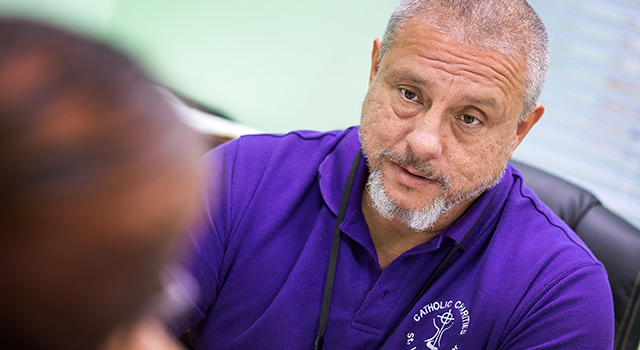By Tom Tracy - Florida Catholic
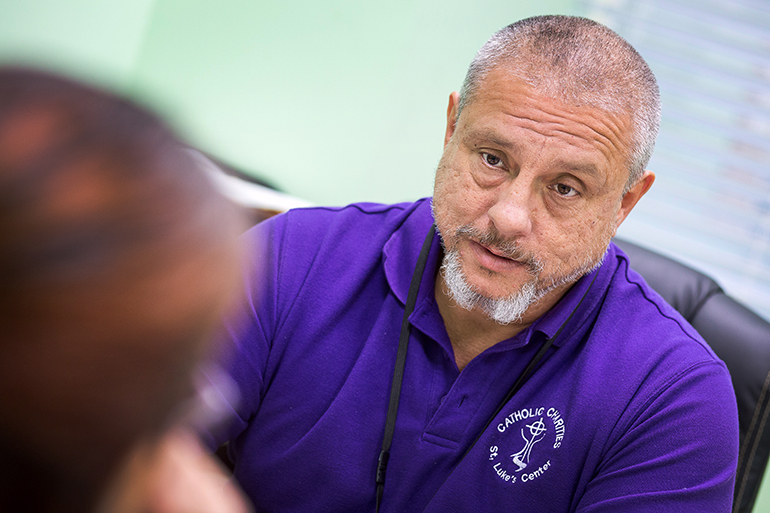
Photographer: TOM TRACY | FC
Alejandro del Calvo is clinical coordinator at Miami Catholic Charities' St. Luke's Center. St. Luke's offers community-oriented, specialized, and evidence-based addiction recovery treatment services for adults with alcohol and/or drug addiction who may also have a co-occurring mental health diagnosis.
MIAMI | Though there will be no gala celebration or special event marking 85 years of Catholic Charities in South Florida — as there was 10 years ago during the agency’s diamond jubilee — this year’s milestone brings much to celebrate.
As a nonprofit focused on serving the poor, marginalized and those most in need in Monroe, Broward and Miami-Dade counties, Catholic Charities of the Archdiocese of Miami now comprises 12 social services programs with 350 staff and a total operating budget of nearly $10 million more than a decade ago.
Charities had its origin as an agency here long before the Archdiocese of Miami was formally established, following the Great Miami Hurricane of 1926 and the Great Depression — both of which put the brakes on an economic boom that was underway in the region.
The agency started in 1931 with four Miami priests and lay members of the St. Vincent de Paul Society. Today, it is one of the largest non-governmental providers of services to the needy in South Florida, carrying on the two millennia-old mission of the Church that can be traced back to Jesus and his apostles.
“Over the last years there has been a steady growth in the programs, from $26 million to $31 million,” said Deacon Richard Turcotte, CEO of Catholic Charities. The result is a greater degree of self-reliance, longevity and faithful service to the Church and needy of South Florida, he told the Florida Catholic.
“The long and short of it is that Catholic Charities is the Church present in the communities (in a way that is different), different from liturgical and education functions of the archdiocese. We are the visible arm of charity and love in the community of South Florida,” Deacon Turcotte said.
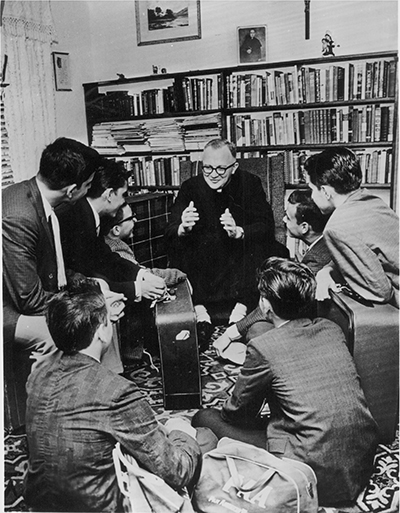
Photographer: COURTESY PHOTO
Under the leadership of Msgr. Bryan O. Walsh, center, Catholic Charities ccordinated the effort to receive and shelter in the U.S. more than 14,000 unaccompanied minors from Cuba in the 1960s. The agency continues to shelter unaccompanied minors and refugees.
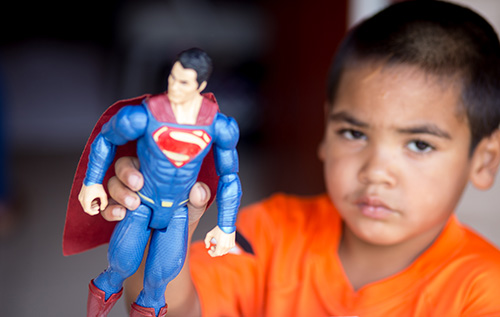
Photographer: TOM TRACY | FC
Five-year-old Armani was living temporarily at New Life Family Center, a Catholic Charities-sponsored motel-style residence providing a safe environment for 15 families while they get back on their feet. Children are the central focus of New Life.
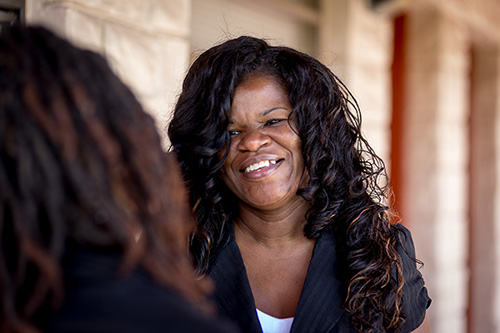
Photographer: TOM TRACY | FC
Janet Nichols, regional director of Housing & Homeless Services for Catholic Charities of the Archdiocese of Miami, talks with clients at at New Life Family Center, a Catholic Charities-sponsored motel-style residence providing a safe environment for 15 families while they get back on their feet. Children are the central focus of New Life.
Back in the early 1970s, when it was called the Catholic Service Bureau, staff used to refer to Catholic Charities as the “Pentagon,” the nerve center of the welfare and charitable activities for the Church in south Florida. It used to include parts of Palm Beach and Naples in what used to be referred to as “the Gulf side of the archdiocese.”
Some of the historical highlights over the years include:
- Operating homes for unwed mothers and foster children in the 1940s and ‘50s.
- Providing food,
clothing and shelter to Cuban immigrants, including unaccompanied children, in the 1960s. - Treating drug addicts and housing teenage runaways in the 1970s
- Opening day care centers for low-income children and nutrition centers for the elderly in the 1980s.
- Caring for people dying from HIV/AIDS and housing homeless women and children in the 1990s.
- Bringing disaster relief to hurricane-ravaged communities in Florida and the Caribbean.
- Helping the people of Haiti following the devastating 2010 earthquake and other weather-related catastrophes there.
Helping families
It could be said that Catholic Charities remains very much focused on helping local families, given that the largest component of programming and resources is channeled to local youngsters in partnership with Florida’s Head Start program.
Catholic Charities’ six child development centers assist 1,200 pre-kindergarten youths in Miami-Dade County, students who are getting ready to enter kindergarten and living in vulnerable family situations. Through the Head Start program, these children have access to testing and other supportive measures to ensure their chances of success.
“It’s not just about preparing for kindergarten, but preparing families and helping them overcome poverty, food insecurity, issues with health, disabilities — our program is holistic” and prepares young students for futures in both public and private education, Deacon Turcotte said.
The second largest basket of Catholic Charities services involves helping refugees in three broad categories: newly-arrived Cuban and Haitian immigrants; unaccompanied refugee minors who entered the U.S. legally and are mostly living in foster care; and unaccompanied minors who entered the U.S. with no legal guardian or family members and who receive an array of support while their immigration status is being determined.
Homeless and housing programs throughout the archdiocese comprise the third largest group of Catholic Charities services in 2016, with that programming moving in step with the federal government’s “housing first” approach, which provides housing before dealing with secondary symptoms and issues.
The New Life Family Center in Miami’s downtown is one example of that (see accompanying story). Catholic Charities is also significantly engaged with the homeless crisis in Key West, where the average income and the cost of living are significantly out of sync with each other. Key West is the fifth-highest city in income disparity in the U.S.
Counseling
Finally, services dealing with substance abuse — including St. Luke’s Center in Miami (see accompanying story) — and general counseling and senior citizens-related programming comprise the fourth largest set of Charities services in the archdiocese. Other high-profile priorities such as the immigration crisis have arisen over the years but counseling services are getting a boost again.
“We have brought our counseling services back up and have been able to endow that as a result of Vision 2000 endowment,” Deacon Turcotte said, referring to an archdiocesan capital campaign carried out for the millennium.
“Now have three full-time counselors in
“By the spring of next year we also hope to restart our adoptions services that will also be permanently endowed,” he said.
The programs will help local mothers who don’t plan to keep their child find suitable adoptive families in keeping with Church principles.
Back to roots
“Counseling and adoption did put Charities on the map in terms of addressing poverty and issues relative to families. Counseling,
Today, Catholic Charities confronts the unique diversity of the South Florida region as well as the size and scope of the wealth-poverty gap that is keenly felt here.
“We see a lot of food and income insecurity for those being paid at a minimum wage level, and people not being covered with health insurance,” Deacon Turcotte
Generous Catholic donors and local foundations have helped make the work of Catholic Charities possible as it moves toward its next milestones of 95 and 100 years of service. Some $125,000 in yearly donations and $1 million in trusts, bequests and foundations currently undergird the agency.
“What I am the
“We are not locked into the same old ways of doing things over and over again. The future of social services is changing rapidly so having that as a characteristic as an agency positions us well for the future,” he added.
Above all, he said, the agency remains true to its slogan: “We serve people not because they are Catholic, we serve people because we are Catholic, and that is who we are called to be in terms serving our brothers in need.”
Ana Rodriquez-Soto contributed to this story.
See related stories:
